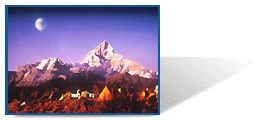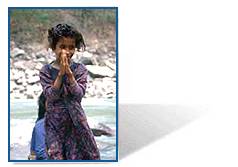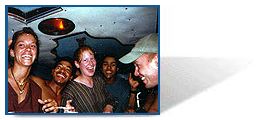|
"My
time in Nepal with your company was the high point of my world travels.
The special Nepal you shared gave me real insights into the wonderful,
controlled chaos of Asia. It was the best!"
Ravi
Fry, Sun Kosi '93
 If
you have never been on a river journey in Nepal before, you're in
for an amazing experience. Very little in Nepal resembles life anywhere
else in the world. This is a place of deep religious customs, the
most radical topography on earth, and one of the least developed infrastructures
in the world. Most of the populations of Nepal are subsistence farmers,
living many days walk from the nearest road. There is no better way
to see Nepal than on a river trip, which by its very nature is the
essence of escapism. Be warned - once you start on this journey, it
may be hard to quit. If
you have never been on a river journey in Nepal before, you're in
for an amazing experience. Very little in Nepal resembles life anywhere
else in the world. This is a place of deep religious customs, the
most radical topography on earth, and one of the least developed infrastructures
in the world. Most of the populations of Nepal are subsistence farmers,
living many days walk from the nearest road. There is no better way
to see Nepal than on a river trip, which by its very nature is the
essence of escapism. Be warned - once you start on this journey, it
may be hard to quit.
Climate:
 One
of the fascinating things about Nepal is that in the space of a hundred
miles you can go from the coldest and most bitter conditions on Earth
to the sweltering heat of the North Indian Plain. Nepal has everything
from the brutal wind-swept Himalayan peaks to humid tropical jungles.
In general it is best to plan for subtropical to temperate conditions
on the rivers. The Karnali is on the subtropical Pahar zone, which
is quite warm and pleasant. The Sun Kosi winds it's way between the
Mahabarat Lekh mountains and the main Himalaya and is also warm. One
of the fascinating things about Nepal is that in the space of a hundred
miles you can go from the coldest and most bitter conditions on Earth
to the sweltering heat of the North Indian Plain. Nepal has everything
from the brutal wind-swept Himalayan peaks to humid tropical jungles.
In general it is best to plan for subtropical to temperate conditions
on the rivers. The Karnali is on the subtropical Pahar zone, which
is quite warm and pleasant. The Sun Kosi winds it's way between the
Mahabarat Lekh mountains and the main Himalaya and is also warm.
Temperatures in
the daytime range from 25-32 degrees Celsius, with evenings being
8 to 10 degrees cooler. Expect typical northern hemisphere seasons,
with a monsoon thrown in. Most people are surprised to find that Nepal
is actually the same latitude as Florida or Egypt, the extremes in
temperature and climate are all due to altitude variations.
Health:
 The
most important and simple thing you can do to prevent serious illness
in Nepal is to arrive properly immunized. Antibiotics and other medications
are available in Nepal without a prescription and at a fraction of
the cost of the rest of the world. You do, however, need to know the
chemical name (not the brand name) of what you want, as well as the
dosages and side effects. The
most important and simple thing you can do to prevent serious illness
in Nepal is to arrive properly immunized. Antibiotics and other medications
are available in Nepal without a prescription and at a fraction of
the cost of the rest of the world. You do, however, need to know the
chemical name (not the brand name) of what you want, as well as the
dosages and side effects.
Dysentery, either
amoebic or bacterial, is the normal ailment that travelers to Nepal
are stuck with. With this in mind, be careful of where and what you
eat in Kathmandu or Pokhara before the trip. Sanitation is a top priority
on our raft trips, and almost without exception all illnesses which
occur on the river are brought from Kathmandu or Pokhara.
If you have
any relevant medical conditions, please make sure they are listed
on your booking form. Also, make them known to your guide and the
trip leader when you meet them in Kathmandu.

Visa Regulations
As per the latest
visa regulation of Nepal, the following provisions have been made
effective with regards to the revised tourist and business visa fees
and changes in the current trekking permit issuing system:
Single entry tourist
visa can be obtained from the entry points of Nepal or from the Royal
Nepalese diplomatic missions abroad by paying US$30 for 60 days. If
visitors who wish to obtain single, double or multiple reentry, they
can get it by paying additional US$25, US$40 and US$60 respectively.
If the visitor,
who has already visited Nepal under tourist visa, intends to come
again within 150 days of the same visa year he/she can obtain entry
visa by paying US$ 50 for 30 days at the entry points or at the Royal
Nepalese diplomatic missions abroad.
Visitors who wish
to stay for more than 60 days in Nepal can extend their tourist visa
by paying the equivalent of US$50 in the Nepalese currency for 30
days from the Department of Immigration.
Business visa
with multiple entry facility for the period of one year and five years
can be obtained from the Department of Immigration on the recommendation
of Ministry of Industry by paying the equivalent of US$100 and US$
250 respectively in the Nepalese currency for the foreign investors.
For further
details please contact :
| Tourist
Service Center,
Nepal Tourism Board
Brikhutimandap, Kathmandu
Tel: 4256909,
4256229, 4247039, 4256216
Fax: 977-1-4256910
E-mail:
info@ntb.wlink.com.np
|

|

 If
you have never been on a river journey in Nepal before, you're in
for an amazing experience. Very little in Nepal resembles life anywhere
else in the world. This is a place of deep religious customs, the
most radical topography on earth, and one of the least developed infrastructures
in the world. Most of the populations of Nepal are subsistence farmers,
living many days walk from the nearest road. There is no better way
to see Nepal than on a river trip, which by its very nature is the
essence of escapism. Be warned - once you start on this journey, it
may be hard to quit.
If
you have never been on a river journey in Nepal before, you're in
for an amazing experience. Very little in Nepal resembles life anywhere
else in the world. This is a place of deep religious customs, the
most radical topography on earth, and one of the least developed infrastructures
in the world. Most of the populations of Nepal are subsistence farmers,
living many days walk from the nearest road. There is no better way
to see Nepal than on a river trip, which by its very nature is the
essence of escapism. Be warned - once you start on this journey, it
may be hard to quit. One
of the fascinating things about Nepal is that in the space of a hundred
miles you can go from the coldest and most bitter conditions on Earth
to the sweltering heat of the North Indian Plain. Nepal has everything
from the brutal wind-swept Himalayan peaks to humid tropical jungles.
In general it is best to plan for subtropical to temperate conditions
on the rivers. The Karnali is on the subtropical Pahar zone, which
is quite warm and pleasant. The Sun Kosi winds it's way between the
Mahabarat Lekh mountains and the main Himalaya and is also warm.
One
of the fascinating things about Nepal is that in the space of a hundred
miles you can go from the coldest and most bitter conditions on Earth
to the sweltering heat of the North Indian Plain. Nepal has everything
from the brutal wind-swept Himalayan peaks to humid tropical jungles.
In general it is best to plan for subtropical to temperate conditions
on the rivers. The Karnali is on the subtropical Pahar zone, which
is quite warm and pleasant. The Sun Kosi winds it's way between the
Mahabarat Lekh mountains and the main Himalaya and is also warm. The
most important and simple thing you can do to prevent serious illness
in Nepal is to arrive properly immunized. Antibiotics and other medications
are available in Nepal without a prescription and at a fraction of
the cost of the rest of the world. You do, however, need to know the
chemical name (not the brand name) of what you want, as well as the
dosages and side effects.
The
most important and simple thing you can do to prevent serious illness
in Nepal is to arrive properly immunized. Antibiotics and other medications
are available in Nepal without a prescription and at a fraction of
the cost of the rest of the world. You do, however, need to know the
chemical name (not the brand name) of what you want, as well as the
dosages and side effects.